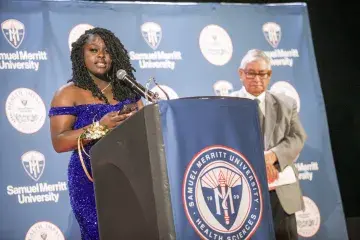Extreme Nursing: Life as a Flight Nurse
Student Voices is a blog series written by SMU students. If you have an idea for a story, reach out to Sasha Solomonov at ssolo@samuelmerritt.edu. This article is written by ABSN alumnus Stephen Nitta.
For most nursing students, there comes a point in your clinical rotations when you wonder which career path you want to take. The possibilities are nearly endless — bedside nursing, home care, administration, advanced practice, pediatrics, medical surgery, etc.—and the choice can be daunting.
I had the opportunity to visit Life Flight at Stanford Hospital alongside my ABSN San Mateo cohort. Life Flight is an air medical program covering Northern California. It has a team of flight nurses who are trained to care for critically ill patients during transport, typically via helicopter. Flight nurses go through rigorous training and perform a much broader scope of practice than a typical RN.
I was so intrigued with flight nursing that I scheduled a follow-up visit with Life Flight Program Manager Michael Baulch to gain more insight into the career. Michael first gained experience as a nurse in the Navy, then became a flight nurse for many years before transitioning into medical transport management. Here’s our conversation:
Stephen Nitta:What are the basic qualifications of becoming a flight nurse?
Michael Baulch: Our minimum requirements are three years of critical care experience plus all of the certifications you would have in that: BLS, ACLS, PALS, CCRN or CEN. Because of the competition, [flight nurses] usually have 5-10 years’ experience. The best quality that you can bring is a sense of calm, and then learning how to communicate with people and have a presence without [upsetting] people.
SN: What is the average background of a flight nurse?
MB: A third of my nurses here are master's [degree] prepared and then two of them are clinical nurse specialists, the rest are nurse practitioners. So we're very, very deep in clinical experience.
SN: Who exactly flies out for a call?
MB: We're one of the few flight programs in California, and actually nationwide, that fly a dual nurse crew, both being experienced critical-care nurses.
SN: Do the pilots have any medical training?
MB: No, we want them focused on one thing and one thing only. I think by assimilation they learn what's bad and what's safe, you know, these guys have been doing it for a long time, but then they're not involved in the care at all. They're solely focused on flying.
SN: Do you think your background in the military made you a good fit for flight nursing?
MB: That’s part of it, but my whole career was sort of unintentionally directed toward a career in flight nursing. I mean, I’ve been in healthcare since I was in high school because I worked in hospitals as a high school student because my mother was a nurse.
SN: How would you describe the culture of Life Flight?
MB: The culture here, these guys are very close here. it's a very tight group. There's very little turnover, so they’ve know each other for a while, but they're here for 12 hours. They need to hang together and they need to get along so when I'm selecting the nurses for this program in addition to their clinical qualifications, I really have to evaluate their ability to work in that small group.
SN: What is the typical day for the flight nurses?
MB: After hand-off report they go upstairs and do all their pre-flight checks, which means checking all their equipment, making sure that they have everything they need. The pilots have their own stuff that they do, but as a crew they’re all responsible for the safety of that aircraft. Then they do a briefing in the morning [with pilots and communications specialists]... If the previous shift did a flight or two, they do a peer review of that chart. Once they finish that stuff, then that’s when they’re free to go around the hospital. They have a lot of down time—they can be [in the hospital], they can study, they can help elsewhere. The trade off on that is… 15 minutes before their shift ends, they get a call that takes them out for two hours, but that’s just an expectation.
SN: Is there anything about flight nursing that you didn’t expect when you first started?
MB: It can be really fatiguing because when you put in all the elements of being in that environment of a vibrating aircraft and working in small spaces, the noise, doing it in the dark, those are the kind of challenges where you say, “Okay, this is what this job is about,” but it really can sap your energy. And then there's emotional fatigue that goes with that too.


